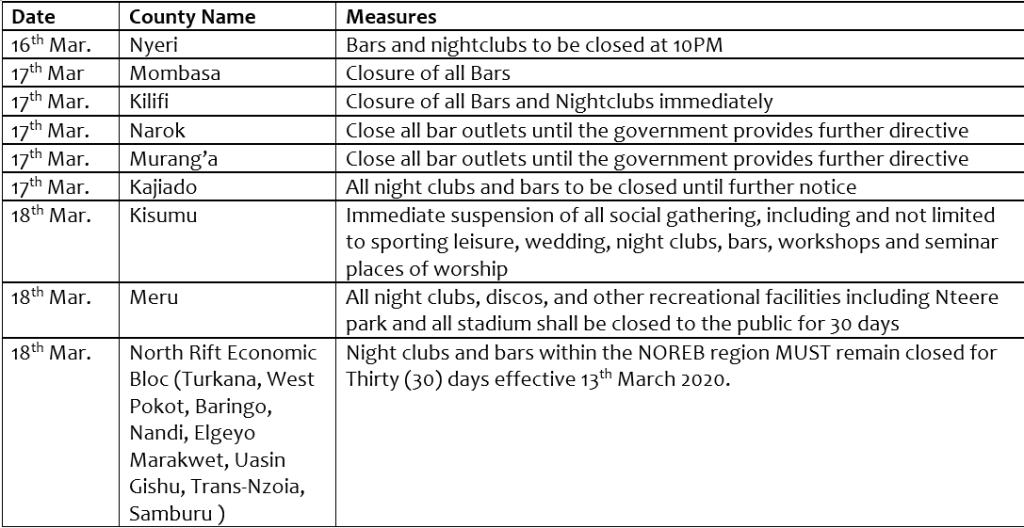Alcohol beverage manufacturers have asked county governments to be considerate as they implement measures to limit the spread of the Covid-19 coronavirus in Kenya and avoid actions that would result in a bigger economic impact than anticipated.
In a letter to Council of Governors (CoG) chairman Wycliffe Oparanya, the Alcohol Beverages Association of Kenya (ABAK) has asked the devolved governments to uphold fair administrative action when implementing directives.
ABAK chairman Gordon Mutugi said that while the industry supports the limits on public gatherings to limit the spread of the virus, the decision by 16 county governments to ban the operations of bars and entertainment spots was unwarranted.
Read: Kenya Takes a More Serious Look at Blockchain Technology
About 9,615 outlets have been affected by the actions taken by county governments in the 16 counties.
“Events related to the pandemic are unfolding at an unprecedented speed, with heavy economic losses experienced across various sectors of the economy. The alcoholic beverage sector currently supports more than two million livelihoods, who directly depend on the alcoholic beverage value chain for their daily upkeep. Closure of bars disrupts value chains, deepening the negative impact of the pandemic to the economy,” said Mutugi.
ABAK asked the devolved governments to consider the fact that the businesses are still obligated to meet their obligations in terms of licensing, loan repayments, salaries, rent and leases, and the responsibilities of taking care of their families.
“Bars employ over 250,000 people who in most cases earn a daily wage. Closing them will render over these people jobless, jeopardise their support for over 2 million livelihoods and directly lead to social unrest. Ultimately this could potentially result in social anarchy including looting, muggings, violent robberies, as has already been witnessed in other parts of the world,” Mutugi warned.
See: Compulsive Masturbation and What it Does to Your Work Life
Most bars are in the category of Small and Medium Enterprises and are mostly owned and operated by women, and employ thousands of youth. Closing them indiscriminately would also push drinkers in the direction of illicit alcohol, which would compound the problem.
ABAK asked the Council of Governors to: encourage good hygiene and social distancing at all public spaces, allow alcohol sales for responsible consumption at home and safeguard communities from the menace of illicit alcohol and avoid outlawing legitimate business communities who are part of the economy that is suffering from the effects of the pandemic.
The association also asked the county governments to implement the advisory published by Makueni, Machakos and Vihiga counties, where licensed outlets have been allowed to strictly operate between 5pm and 11pm. Health Cabinet Secretary Mutahi Kagwe has also asked bars to operate within the set hours and as per the guidelines to limit the spread of the coronavirus.
It also asked the county enforcement teams to implement the governments’ directives and to safeguard licensed bar owners and distributors against punitive action by law enforcement agencies that may engender their lives and risk the investments if poorly managed.
ABAK and its members are running a robust campaign to promote hygiene through the donation of over 100,000 litres of hand sanitisers to 40,000 bars, 7,000 direct employees, and 2.4 million vulnerable urban population living in slums.
The association is also driving public awareness by printing 100,000 pieces posters to sensitise the over 40,000 bars on the coronavirus pandemic and the measures they should take to minimise the spread of the virus and publicising the same through social media pages while discouraging overcrowding at the bars by offering bar owners the option of stocking portable alcoholic drink formats.
ABAK is also encouraging consumers to buy alcoholic products to consume at home responsibly and practise social distancing.
County governments that have banned operations of bars and entertainment establishments (as at 19th March 2020)













Leave a comment